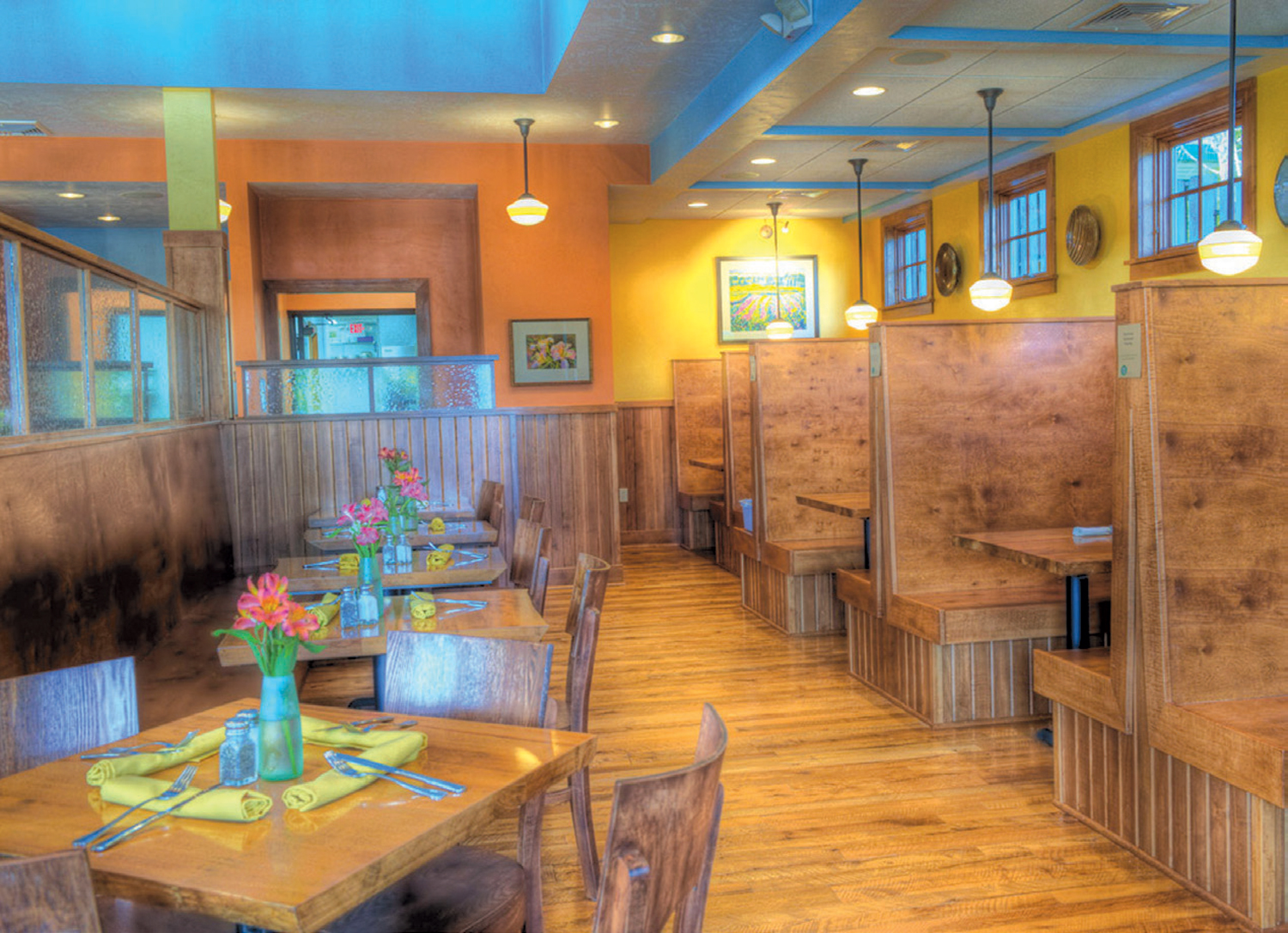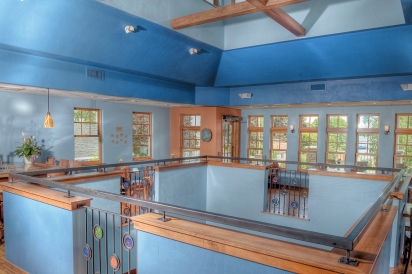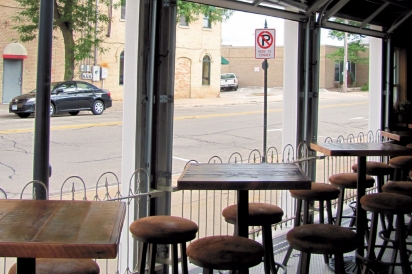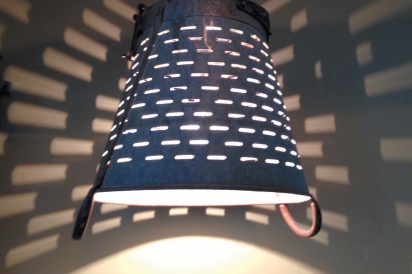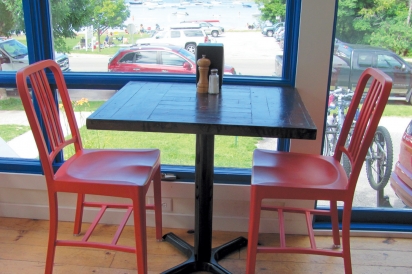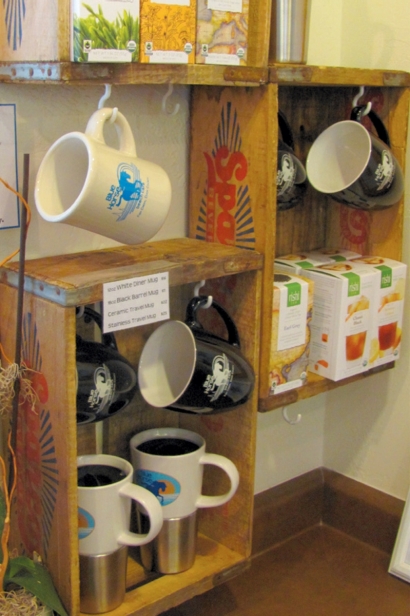Restaurants Also Serving Up Reclaimed History
The Cookery Restaurant has been situated on the same spot in Fish Creek along shore-tracing Highway 42 since 1977.
Part of the philosophy that’s made The Cookery successful is the owners’ commitment to re-use and recycle, evident in the design elements of the building constructed in 2009 after a devastating fire. Owners Dick and Carol Skare with daughters Karin and Courtney Holdmann-Skare conscientiously incorporated materials and practices into the new two-story building that helped them achieve Travel Green Wisconsin certification.
The dining room and wine bar floors are constructed from reclaimed barn beams – a variety of ash, elm and oak. The floorboards were cut and laid to create a rough textured floor, stained a deep red-brown. Maintenance on the floor is the same as with any wood floor, Holdmann-Skare explained. The advantage to the rough cut boards is their ability to hide wear and tear. The wine bar and dining room host stand are made from reclaimed elm. The front faces of the wine bar and host stand are covered with a linseed oil linoleum and Dakota burl – a material made from recycled sunflower seeds in Minnesota.
Carol Skare’s Minnesota dairy farm upbringing instilled in her a “re-use” philosophy that’s carried into the daily operations of the restaurant for both ecological and financial savings. Daily “green” operations include the recycling of fryer oil, canning their own cherries and reusing cherry buckets for a variety of purposes.
“We turn leftover cinnamon and crumble rolls into our bread pudding and skorpa,” Holdmann-Skare said. “Any surplus produce or meat is often turned into soups.”
The Skares choose to provide recyclable to-go food containers and coffee cups in the new restaurant.
“Five years ago, these types of containers were really difficult to obtain and were almost prohibitively expensive,” Holdmann- Skare said. “Now, we go to food shows, and they’re everywhere.”
New to the Green Bay area restaurant scene is S.A.L.T., a restaurant specializing in comfort food with 21st century variations. Fitting for a restaurant in the heart of the De Pere historic district on the corner of Main Avenue and Fourth Street in what has been the home of the West End Pub and Days Inn. Multiple rooms allowed designer Pat Drury creative freedom to install unique focal pieces and creative surprises, such as an old leather juror’s chair from the Manitowoc County Courthouse in a corner, or a repurposed European olive picking bucket as a lamp.
Co-owner and Executive Chef Ben Raupp explained S.A.L.T.’s philosophy and design choices. And no, the name is not an acronym, merely instigation for discussion.
“We built the restaurant around old things, with a new twist,” Raupp said. “We call our food style ‘modern comfort’. The dishes are things people recognize, have a connection to, a food memory, but are slightly different. The same goes for our design philosophy.”
Drury is able to recall where he found each piece installed in S.A.L.T., and a story as well.
“All the dental molds (teeth-shaped trim) came from a priest’s house in East De Pere before it was torn down,” Drury said. “The louvered glass panels above the wine bar are from an antique store in Algoma; the stamped tin on the outside of the building is new, but it’s from the company in Kansas City, Missouri that made the original tin stamp for the building; and the wrought iron gate in the outside patio is from Bay Trading in Egg Harbor.”
From the repurposed wood in the tabletops, the use of salt & pepper shakers as light fixtures in the women’s restroom and an old frosted glass-paneled door that covers ceiling lighting in the men’s room, little surprises appear everywhere.
Perhaps the most obvious is the imaginative use of garage doors to transform the casual bar area into indoor/outdoor seating. The wooden framework around the beer taps in the dining room bar was cobbled together with pieces of a quarter sawn oak piano.
“We took the keys out, turned it upside down, and you can still see the plate where the foot pedals were,” Drury said. And the antique looking bar backs? “The only thing original in the front bar are the coat hooks!” All of the other pieces were found or crafted by Drury and his team.
“Americans are terrible, we keep throwing our history away,” Drury said. “We need to stop that.”
Blue Horse Beach Café in Fish Creek moved down the road (Highway 42) into a former vacation rental home and turned the first floor of the building into a coffee shop with a water view. The hardwood floors of maple, and fireplace of Door County beach stone, are the only two original inside elements of the home that Carina Helm and co-owner Eric Rasmusson retained. However, the reclaimed and repurposed fixtures and furniture in the coffee shop keep the space from having that brand-new feel.
Coffee klatchers recline in classic orange leather hobnail wing back club chairs, a find Helm scored in a secondhand store in Sturgeon Bay that supposedly came from an old supper club on the peninsula. Blue Horse’s enclosed porch offers hard, red plastic “111 Navy” chairs, designed through a partnership between furniture manufacturing company Emeco and Coca-Cola and made from 111 recycled PET (polyethylene terephthalate) bottles. Helm discovered the 111 Navy chairs online, and said they fit with her décor, in addition to being eco-friendly.
Trips to the Habitat for Humanity ReStore in Sturgeon Bay resulted in cabinets, light fixtures and doors, and each was touched by Helm’s fl air for creative decorating. She and Rasmusson consciously designed the outside walk-in cooler to look like the exterior of the building and blend in with the surrounding homes. A finishing touch was the nod to Blue Horse’s 12 years in business: a shelf displaying the various coffee mugs Blue Horse has served from and sold.
“We put so much thought (13 months) into the planning, design and retro-fitting of the building that it feels like we’ve already been here for a long time,” Helm said.


